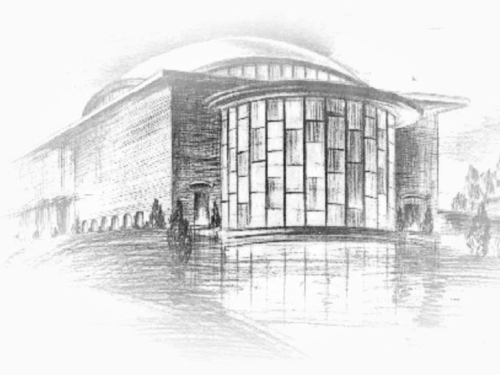

The Early Years: 1950s – 1960s
Twenty-two families gathered in the backyard greenhouse of a home on Baywood Avenue in Hillsborough. The date was May 9, 1955. The meeting had been called by Harold Shanzer to propose the organization of a new temple. By the time the meeting had adjourned, Temple Sholom had been born and bylaws had been drafted. Mel Dollinger, on behalf of the Advisory Committee, approached the Congregational Church of San Mateo and arranged for use of their sanctuary and social hall for the new Jewish congregation. Five years later, a commemorative book described the very early days of our congregation:
Other little-known behind the scene activities were these: A member borrowed one hundred prayer books from a sister temple and obtained a Torah which had been used by the Armed Forces. The ark housing the Torah was a converted cupboard, and the eternal light was a candle on top of the ark. Blue and White satin was obtained and a tailor commissioned to make the torah and pulpit coverings. The fringing and embroidered Mogen David were his own designs. He was assured that the mitzvahs he had earned, while less negotiable than money, were nevertheless, more valuable. Within a month, membership had grown to forty-seven families.
The first Shabbat service was held on Friday, June 3, 1955 at the Congregational Church in San Mateo. This service and the first High Holiday services that year were lead by Dr. Kenneth Zwerin, who served as both rabbi and Liturgical Director until our beloved Rabbi Gerald Raiskin was hired as our first rabbi on April 7, 1956. Also in 1955, Robert Bofird was hired as the liturgical soloist, Val Ritchie served as the first organist for our services, and Dr. William Goldwater was hired as the first religious school director.
In 1955, devoted members of the young congregation purchased and remodeled the building at 849 North San Mateo Drive and presented their interest in the building as a gift to the temple. This became the first home of the congregation and by September 1955, 136 children were enrolled in the religious school. Hebrew School started in January 1956. We were soon out of space at the North San Mateo Drive building and classes were held in rented space across the street. By 1957, so many new families had joined the congregation that the religious school began double sessions on Sundays. Chester Zeff became principal of the religious school in 1958.
The PTS Men’s Club and Sisterhood formed in 1955 to arrange fundraising, volunteer, and social activities for the congregation. Allen Levy was the first Men’s Club President (which turned into the PTS Brotherhood) and SaraRae Miller was the first Sisterhood President (now called Sholom Women).
In November 1957, the Board of Trustees approved a written agreement giving the congregation the right to purchase four acres of property on Sebastian Drive in Burlingame for construction of a new synagogue and religious school. The following June, architect Leonard Michaels was hired to design the new Peninsula Temple Sholom on the hill in Burlingame.
The new building was dedicated on May 7, 1961. At that time, Rabbi Raiskin wrote:
As Peninsula Temple Sholom enters into this sanctuary for the first time, it is a moment of awe, especially for the rabbi. I pray that I may lead this congregation with love, and direct the hearts of those who enter this House of Worship toward our Heavenly Father. May I, through preachment and example, through teachings and daily association with my people, help bring ever nearer the blessed age, when this shall be the faith of mankind: “One God over all: One brotherhood of all.”
The Usher Corp was started for the High Holidays and the first Confirmation Class trip to Israel took place during this decade. In October 1967, Cantor Barry Reich was hired as Peninsula Temple Sholom’s cantor, B’nai Mitzvah and Tefillah (prayer) teacher, and choral director.
Modern Times: 1970s – 1990s
In the 1970s, Brotherhood and Sisterhood activities continued to be very popular. A Peninsula Temple Sholom basketball team was started and continued through the Jewish Athletic League through the 1990s. The Adult Education Program was started and flourished with Sunday morning lectures.
Early in the next decade, the 1980s, the Sholom Chorale was started and began performing at Shabbat and High Holy Day services. As the congregation grew, there was a need to hire assistant rabbis. Rabbi Irving Ungar and Rabbi Marvin Schwab contributed greatly to our congregation during their time with us. And, as more and more young couples joined our synagogue, we were pleased to open a nursery school as part of the religious school programs.
In the late 1990s, a feasibility study was conducted and preliminary planning began for renovations and new construction at the temple. Fundraising and planning continued into 2000. When the new construction was complete, our temple had a new entryway, expanded social hall, a new library and gift shop, and an entirely reconstructed school wing, the Rabbi Gerald Raiskin Torah Center. Enhancements were made to the sanctuary dome, and the spacious lobby was enclosed and adorned with art and light. In the garden courtyard, plants, stones and artwork evoke the colors and landscape of Israel.
PTS Today: 2000s
In April 2006, shortly before his scheduled retirement, Rabbi Raiskin died, leaving a legacy of love and connection that continues to this day. In 2018, after 51 years with PTS, Cantor Barry Reich retired, becoming Cantor Emeritus.
Under the leadership of Rabbi Dan Feder since 2006, the congregation continues to thrive as we worship, learn, and celebrate together.
Over the years, many wonderful assistant and associate rabbis have served the PTS community including Rabbis Andrew Straus, Jay Miller, David Wirtschafter, Kim Ettlinger, Rebekah Stern, Molly Plotnik, Liora Alban, and currently, Julia Berg. Today, Rosa Whitten (Director of Education) serves our community. In addition, we have a history of warm and talented cantors serving the congregation who have followed in Cantor Reich’s footsteps, including Alexandra Fox, Anna Zhar, and currently, Yonah Kliger.
Learn more about our clergy here.
As we look to the future, PTS continues to put relationships at the center of all that we do, with each congregant moving along a personal path to belonging.





